| Spotlight
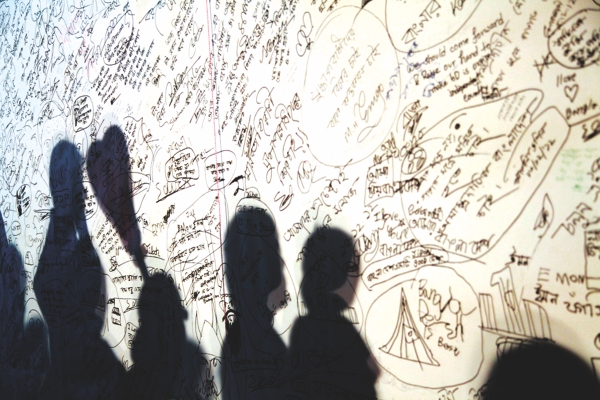
Right
this
Moment
Saad Adnan Khan
Photos: Kazi Tahsin Agaz Apurbo
But no one really wants to change anything
If you really want to
You have to give something up
Like everything.
- Eve Ensler, Writer and Activist.
As young Bangladeshis, living in Bangladesh, we have many dreams, hopes and expectations. We talk about them again and again, hoping that we attain those dreams and hopes sometime soon, hoping that our government hears us. We want a healthy study environment, when 'student activists' (two words that no longer mean anything) will not threaten us to join them, where they will not beat us, where we will manage to graduate without being stabbed or raped by them. We want the government to ban 'student activists.' We want to study at universities, where infuriating bureaucracy will not make us anxious and frustrated, where we can get a simple transcript without filling out unnecessary applications and waiting for signatures, delaying the process. We dream of classrooms where teachers will not be immature, insensitive, where they will be enlightened and kind enough to be respectful of students and their opinions. We do not want hartal and session jams, so that we can do classes on time, so that we can get jobs on time, so that we can contribute to the economy on time. We do not want violence and harassment on streets, so that we can have a sound mind to study, so that we do not have to worry to leave the country. We want less traffic, so that we can get to classes and work on time. We want this, we want that. These demands are not new and not at all idealistic. The only thing we want in order to achieve these dreams, is our own political will. From our sides, and also from the government's side.
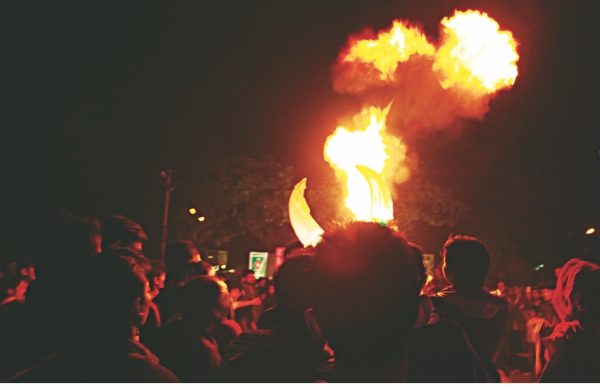
As we step into a new year, we make resolutions for the reformation of our current political state.
 Let's not even talk about our politicians. Our politicians miserably fail to give us hope, motivate and inspire us again and again. When political leaders do not care about the kind of impression we, young people have about them, it is not a surprise that bureaucratic figures in university administrations think and act in a similar way. During the three day long non-violent protest at BUET in December 2011, when the students demanded that the Chhatra Leaguecadre who beat up the graduating student Ehsan be removed, the students on the final day of the verdict from the Vice Chancellor, were worried that they might be attacked by Chhatra League activists from Dhaka University or Dhaka College. The police would have swooped in if any kind of chaos had broken out. Non-violent protests also have to be done in an environment that is hostile and unpredictable for the non-violent protestors. Let's not even talk about our politicians. Our politicians miserably fail to give us hope, motivate and inspire us again and again. When political leaders do not care about the kind of impression we, young people have about them, it is not a surprise that bureaucratic figures in university administrations think and act in a similar way. During the three day long non-violent protest at BUET in December 2011, when the students demanded that the Chhatra Leaguecadre who beat up the graduating student Ehsan be removed, the students on the final day of the verdict from the Vice Chancellor, were worried that they might be attacked by Chhatra League activists from Dhaka University or Dhaka College. The police would have swooped in if any kind of chaos had broken out. Non-violent protests also have to be done in an environment that is hostile and unpredictable for the non-violent protestors.
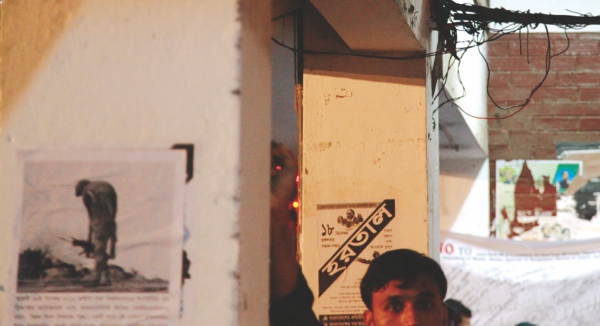
Hartals and session jams stand as barriers in our daily lives.
After Biswajit was murdered, the government, instead of chastising Chhatra League activists, denied that these murderers belong to Chhatra League at all. Lies are concocted openly, even though there are more than enough evidences to prove otherwise. Young people in the country have to look at Barack Obama's elocution for inspiration instead, who keep bragging about how he will make the USA the best nation in the world. How can that be inspirational for Bangladeshis?

To break free from the political dictates, young individuals must act.
Students, parents and human rights activists cannot stress enough on the importance of a safe and secured educational environment. The law enforcers without sheer doubt, are the last people one can rely on for protection. They beat journalists and teachers, and they also stand lenient and inactive when a person is being murdered in front of their eyes or when people do not follow traffic rules.
The government can easily take a little money out from the national defense budget and spend it to train the law enforcers instead, who have to protect and function in the very centre with us, the commoners. It is not news that their inefficiency is due to lack of benefits and a good salary. On May 20, 2012, fifteen noted educationists and civil society members of the country expressed grief and concern over the police force violence towards the non-government primary school teachers. They stated that there should be human rights training for law enforcers of the country. This was not a joke; it was a sincere demand that requires urgent implementation before more students get eve teased (sexually harassed) on streets, before more students get beaten and killed by student activists.
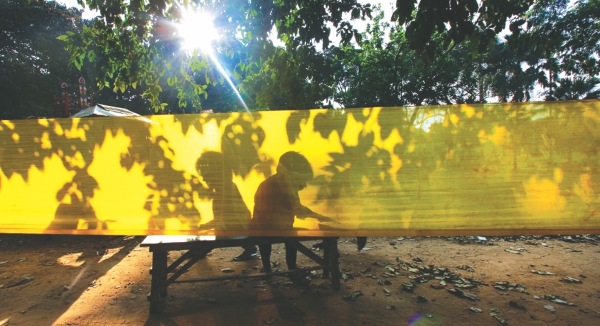
A new and different governance has been emerging for some time now. This is the governance that we see is being brought about by student organisations. How do they do this? Why would these young students want to do anything at all for someone else, after doing classes in the morning (or evening), staying stuck in traffic for hours, doing part time jobs in the evening (or morning)? If we have these 'student activists' of Chhatra League, BNP or Jamaat-e-Islam, we also have student volunteers and activists of student organisations like One Degree Initiative, Community Action, Jaago and Bangladesh Youth Leadership Center. They do not work in their own neighbourhoods only, but also at the national level. They have gone out of Dhaka to reach out to the people all over, personifying the very meaning of decentralisation of education and access to information.
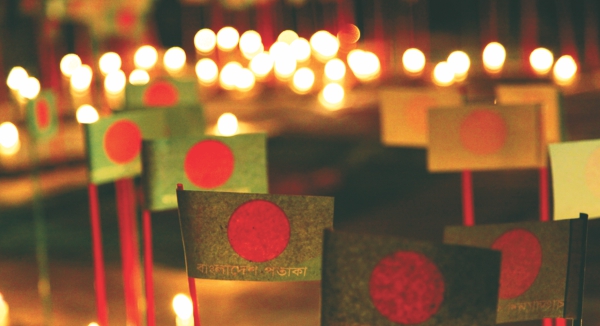
Hope rises as individuals come to the rescue of the nation in the form of youth organisations.
In return, if these students want a safe, healthy environment to study and grow, it is not a very unrealistic demand to the government. In return, if students want a bike lane, so that they can bike and reduce traffic, it is not an unrealistic demand. These young people work to ensure basic needs of human beings, literally fulfilling the role of a government that we envision. Why are these young volunteers and activists and 'actioneers' so active? Why do they do what they do? Quite simply, because they love doing them.
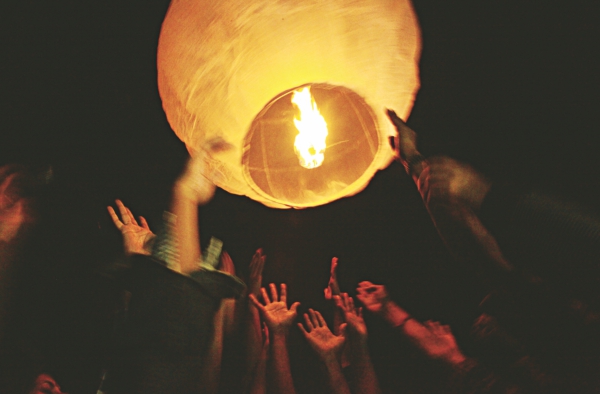
As we step into a new year, we make resolutions for the reformation of our current political state.
As we step into a new year tomorrow, let us make few resolutions. These resolutions are for us, because the government does not seem to have our backs. Sometimes society might not have our backs as well. We would not let ageist remarks by others affect us—misconception that young people are naïve and that they live in a bubble, that they do not have enough experience to bring changes; we will continue to give up on our privileges, because we know privileges are accidents. Sometimes, people systematically get hold of privileges, and we know the consequences of having privilege. We also know the advantage of having privilege, and the necessity to give them up, in order to do something. We would continue to study what we want and love to study; we would not study something that our parents forces us to study because they think this is the 'right' and 'stable' field of study. It is through these resolutions that we will be selfish and obsessive enough to do something for ourselves and the people around us; if we have a talent, we will show it to the world, because we need more positive power, hope and energy. This is the new governance. We would not limit ourselves to being mundane. We would be great.
|
